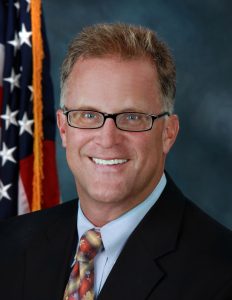Cronin: Consolidation tax saving is DuPage Co. ‘brand’
Jean Lotus, Chronicle Media — December 28, 2016
Dan Cronin, DuPage Co. board chairman (Chronicle Media)
Squeezing local units of Illinois government together and eliminating agencies that have outlived their purposes is saving taxpayer dollars in DuPage County. Republican County Board Chairman Dan Cronin thinks these savings have something to do with the county’s 2016 low unemployment rate (4.7 percent — lower than surrounding counties) and the millions of dollars of investment brought by 100 new medium-sized business projects that started in the county last year, creating an average of 50 jobs each.
Cronin believes the county’s 2012 ACT (Accountability, Consolidation, Transparency) Initiative is paying off in small ways that improve the quality of life for DuPage residents, and in big ways, such as the $100 million the county estimates has been saved.
“I’m proud of DuPage County’s ACT Initiative. I see it as our brand, our way of doing business,” Cronin said in an email. Four taxing units have been eliminated so far in DuPage Co. These are Fairview Fire Protection District, the DuPage Fair and Exposition Authority, the Timberlake Estates Sanitary District and, most recently, the Century Hill Street Lighting District.
Taking care of the quarter-pennies has freed up dollars in DuPage. The DuPage Water Commission was converted to a self-sustaining utility, and the quarter-cent DuPage Co. sales tax previously used to fund the district has been erased. This saves $36 million a year, Cronin’s office said in a statement.
The county has looked at ways to share the costs of services with other units of government. Cronin likened this to expanding out of “silos” at a videoed April interview with the Better Government Association. One example is a “shared-service” agreement with Kane County, renewed in 2015, to outsource juvenile detainees at a youth home in St. Charles. An average of 13 DuPage youths are detained in Kane Co. per day, at a cost of $120 per day each. In previous decades, the number of detained juveniles at the $3.5 million per year 80-bed DuPage Co. Juvenile Detention center averaged almost 50 per day. But the need for juvenile detention homes has shrunk as the court system has turned to other community alternatives for juvenile offenders.
DuPage Co. also works with other municipalities and township road authorities to buy road salt in bulk, receiving a lower price, Cronin said.
For 2017, Cronin’s offices have proposed the consolidation of the DuPage Electoral Commission into a branch of the DuPage County Clerk’s office. A bi-partisan electoral board would be created, chaired by DuPage County Clerk Paul Hinds. The clerk’s office already funds the election commission, which employs 18 people and has a $4 million annual budget, so savings may not be immediately apparent, but efficiencies will, the offices hope.
The county is also suggesting next year that residents in the Lombard suburb of Highland Hills might like the choice of eliminating the Highland Hills Sanitary District and receive water service directly from the county, eliminating another taxing body, Cronin said.
Cronin is cited as an inspiration by other reform-minded county board members, such as Winnebago Co.’s new chairman Frank Haney.
“[Haney] seems eager to pursue the types of reforms that lead the way toward a more efficient, effective system of local government for the residents of Winnebago County,” Cronin wrote. He mentioned working with county government officials in McHenry, Lake and Cook counties. Cronin and some likeminded local reformers have started a statewide group called Transform Illinois.
“I believe we could save many millions more as a state if other counties would replicate our efforts,” Cronin wrote. “We are all, to various degrees, interested in creating a leaner form of government that takes advantage of technology, joint procurement and local collaborations that allow us to provide excellent services to residents while squeezing value out of each tax dollar.”



